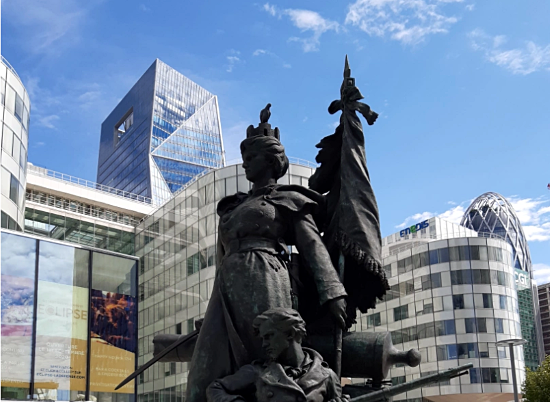WARS ARE OFTEN STARTED FOR DOMESTIC REASONS: IN 1870...
Bismarck wants to unite the German states around Prussia and Second Empire reactionaries want to break liberal opposition. Émile Zola's protagonist Nana,* a high-end escort symbol of the Second Empire, hears the cry "To Berlin!" from her deathbed.
*Eponymous novel, 1879
Within six weeks Emperor and much of the French army are taken prisoner.
(On September 2, by the Battle of Sedan)
L'Infantrie prussienne repousse la cavalerie française (August 6, 1870), Musée d'art et d'histoire de Saint-Denis
The French attack, the Prussians repulse them.
 |
Les Funérailles du drapeau (detail) by Emmanuel-Auguste Massé / undated, antiquarian sale / zoom |
A general tears up a flag and gives the pieces to his troops so it will not become a trophy.
 |
Napoleon III surrenders (Arte, a Franco-German television station) / YouTube 2006
Otto von Bismarck and Napoleon III after the Battle of Sedan in 1870 by Wilhelm Camphausen, 1871 / zoom
|
# # #
In Paris a republic is proclaimed: France's only bloodless revolution succeeds in a single morning.
(On September 4)
Histoire de la Revolution de 1870 by Jules Claretie, 1872 -1875
|
"A human sea filled place de la Concorde. Paris did not bother to worry about Napoleon III, the Republic existed before it was proclaimed."
The Empress flees, leaving lunch on the table.
# # #
The split between conservative republicans and those for social change appears immediately:
- To avoid the explosive term "Republic," conservatives say "Government of National Defense."
- Recalling their betrayal of the popular revolution of 1830 and support for the massacre of June '48, within hours radicals demand elections in each district to supervise mayors and collect requests.*
*"A Montmartre doctor jumped on a table to make the proposal... in an ambiance greatly influenced by the French Revolution, it had to recall Camille Desmoulin's call to arms." -- Letter published in the newspaper Rappel of September 6,
cited in The Republican Central Committee of the Twenty Districts of Paris
by Jean Dautry and Lucien Scheller, 1960 (in French), p. 13 / zoom
- Next day 4-500 militants establish a Central Committee as a counterweight.
# # #
When Bismark demands Alsace-Lorraine, a war about a dynastic quarrel in Spain becomes a fight for France.
-- A narrative that is exceptionally clear: Le Siège de Paris by Pierre Dominique, 1932
Karambolage (a French-German television series) Youtube, 2020 (in French)
Germany's keeping Alsace-Lorraine would have infinitely more serious consequences than payment of huge the huge reparations, which the coins represent.

Le Monde illustré
|
"Seeking funds for the wounded in the streets of Paris by battalions of the national guard" (Notice the military parade in the background.)
|
It culminates with the Prussian siege of Paris:
(September 19, 1870 - January 28, 1871)
La Ville de Paris et ses environs, 1871 / zoom
- Hunger and cold: the winter of 1870-1871 is one of the coldest of the century.
Musée Carnavalet
The French word "queue" (tail) enters English when British journalists use it to describe the impoverished waiting in line for supplies.
 |
Abattage d'un elephant, anonymous engraving, 1870 / zoom
|
The wealthy patronize the black market and eat zoo animals. A society woman hosts a dinner for 22 guests who feast on antelope, ham and turkey.
-- Georges Valance, Thiers
Servants know of the event, and news of that and similar occasions add to popular fury.
- Bombardments begin on January 5, and on the day before the armistice are even more intense:
 |
Zoom
|
Guerre de L'invasion ("The War of Invasion"),1870-1871"
Le Monde illustré, January 28,1871 / zoom
"Left-bank inhabitants install themselves in their cellars."
Aggravating a situation that is already explosive, the conservative government...
- Denies that Metz capitulates without fighting (on October 28) and publishes optimistic bulletins that no one believes.
-- This statement and and the next from Memoires d'un révolutionnaire, de juin 1848 à la Commune by Gustave Lefrançais 1886-1887
- Forces immediate payment of customs from a farmer bringing cattle and supplies into town when the siege is imminent, refusing an I.O.U.
- Forbids using the barriers that surround properties as firewood. (It does allow tearing down trees, but the wood is too green.)
- Fails to establish coherent price controls or rationing. In the particularly miserable 13th, there is no rationing until the last days of the siege.
-- Gérard Conte, Éléments d'histoire de la Commune dans le 13eme arrondissement
(Elements of History in the 13th Arrondissement), 1989
The sources show many more such details.
# # #
The mortality of the poor quadruples. Louise Michel says that in poverty-stricken Montmartre, a fourth of newborns die.
-- Louise Michel
Montmartre toward 1900 / zoom
Suffering strengthens the resistance of lower and lower-middle-classes, but the wealthy, who are relatively spared, as early as December plan a church to atone for sins of the left that, they say, have led to defeat:
Richard Nahem, Eye Prefer Paris









.jpg)



















